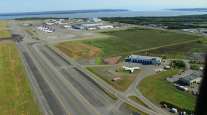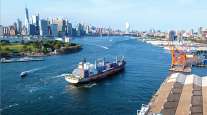Rockford Airport to Add 500 Jobs

ROCKFORD, Ill. — A $9 million federal grant will pay for expanded parking for cargo jets at Chicago Rockford International Airport, where the nation’s 22nd-busiest airfreight hub soon will add 500 jobs.
The grant, announced May 15 by U.S. Sens. Dick Durbin and Tammy Duckworth and Rep. Cheri Bustos, comes from the U.S. Department of Transportation and may only be a taste of what’s to come, airport Director Mike Dunn said. The airport has asked the Department of Transportation for $35 million to orchestrate a massive, 15-acre expansion of the airport’s cargo apron that would allow many more cargo jets to park at RFD.
Pinnacle Logistics and RFD announced 500 new jobs will be available starting immediately in all positions to support additional cargo flights at RFD. The available positions are seasonal/permanent and start at $14 an hour. For more details visit https://t.co/F1jBGw34hS. #FlyRFD pic.twitter.com/FWDaDEFQSC — CHI RFD INTL AIRPORT (@FlyRFD) May 15, 2019
Pinnacle Logistics separately announced cargo-related job growth, saying it plans to add 500 jobs at the airport, where it employs 235 people who provide ground services and supply chain management for Amazon’s Prime Air cargo fleet. The new Pinnacle jobs include seasonal and permanent positions with pay starting at $14 an hour plus a $1 premium for night and weekend shifts. The company will hire workers for entry-level positions, leads, supervisors and managers on duty, as well as dock workers, forklift drivers, and ramp and cargo warehouse handling agents.
Pinnacle will send 15 human resources professionals to Rockford in coming weeks to oversee the recruitment, interview and hiring process. The peak period for Prime Air cargo activity begins in October and runs through the Christmas holiday season, which may create enough demand for cargo work that Pinnacle would need to hire even more than the 500 positions announced May 15, said Peter Weir, Pinnacle’s vice president of operations.
“There is so much opportunity for this growth here in Rockford,” Weir said.
Smooth operator
Pinnacle has found success in Rockford, Weir said, because airport officials make it easy to do business here. Obtaining employee security badges and work permits is among the company’s most arduous tasks given the myriad federal security regulations involved in the operation of U.S. airports. But at Rockford’s airport, Weir said, “These guys are on the ball, and they do their background checks very quickly and they work with us all the time.”
It’s that kind of can-do attitude that has brought tremendous business and job growth to the city’s airport, Mayor Tom McNamara said. The airport is wrapping up a $10 million, 120,000-square-foot expansion of its 72,000-square-foot international cargo terminal, which will be ready for occupancy July 1. Last year, about 1,000 jobs were created on the airport campus, including seasonal and full-time positions and construction jobs related to various airport expansion projects.
“To hear firsthand from a company that doing business is easy in Rockford, and specifically at this airport, that’s exciting to hear,” McNamara said. “It means we’re on the right track,and we’re doing the right things.”
Rockford is part of the national hub-and-spoke cargo distribution system that Amazon is building as it learns how to operate its own air cargo network. Pinnacle also is working hand in glove with Prime Air operations at regional airports in Minneapolis, Baltimore, Dallas, San Antonio, Allentown, Pa., and Windsor Locks, Conn.
Cargo cash
The grant announced May 15 is the first installment from the feds, Dunn said, adding that “we’re hoping for two or three installments” in all.

The cargo apron must grow, Dunn said, because UPS Inc. is expected to expand its footprint at the airport in the near future. UPS made waves last year when it announced a $15 million investment into its Rockford Air Hub, the freight carrier’s second-largest air cargo operation in the country behind its Louisville, Ky., cargo hub.
About $2 million to $3 million of the airport’s $35 million federal funding request would pay for expansion of two retention ponds at the airport where glycol — the chemical used to de-ice planes — is held while it is treated and cleaned. The clean water is then returned to the Rock River. The airport typically uses about 250,000 gallons of glycol a year to de-ice planes that fly in and out of Rockford. Glycol usage easily could swell to 400,000 gallons a year once the UPS expansion unfolds, Dunn said.
The cargo apron expansion will be a two-year construction project, Dunn said.
The city’s airport plays a vital role in the economy of the Rockford region, Bustos said in a news release. The airport brings “good-paying jobs and business back home to our community, and I’m excited by their outstanding work and continued growth,” she said.
In March, Bustos founded the Air Cargo Caucus to spur collaboration in Congress on cargo-related issues. Since 2015, Durbin, Duckworth and Bustos have secured more than $33 million in federal funding for improvements at the Rockford airport, including $5 million announced in July 2017 for the construction of a 30,000-square-yard cargo apron to provide additional aircraft parking.
About 10 cargo jets a day are flying in and out of Rockford’s airport, and Dunn said he expects those numbers to grow. The city’s airport, now the nation’s 22nd-busiest airport in terms of cargo volume, should move up “somewhere between 15th and 20th” place when the Federal Aviation Administration releases new airport cargo volume figures in July.
Distributed by Tribune Content Agency, LLC




